TODAY’S READING FROM THE OLD TESTAMENT- ISAIAH 3:1- 5:30
 To whom much is given, much will be required (See Luke 12:48). Those who are given much light will be judged more severely. In the first section of Isaiah, we read much about the judgment of nations. But Isaiah starts with Israel. God holds Israel accountable. It was God who formed this nation according to His promise to Abraham. He made Himself known to them, pledging His presence and preserving protection. They had the privilege of special revelation- God’s dealings, His law, and the gospel provision prefigured in the tabernacle. With privileges, comes responsibility.
To whom much is given, much will be required (See Luke 12:48). Those who are given much light will be judged more severely. In the first section of Isaiah, we read much about the judgment of nations. But Isaiah starts with Israel. God holds Israel accountable. It was God who formed this nation according to His promise to Abraham. He made Himself known to them, pledging His presence and preserving protection. They had the privilege of special revelation- God’s dealings, His law, and the gospel provision prefigured in the tabernacle. With privileges, comes responsibility.
Israel had more light than their neighbors. Light rejected brings severe consequences in the disciplinary measures of God.
Isaiah Chapters 2 through 5 represent one prophecy. God reveals both the prospective glory intended for His people, Israel and the prospective chastisement for rejecting their responsibilities to walk in the light.
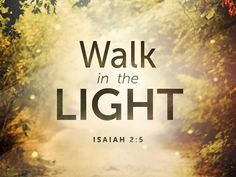 The invitation that God originally gave to Israel, He extends to all who repent and believe the gospel.
The invitation that God originally gave to Israel, He extends to all who repent and believe the gospel.
Isaiah 2:5 5 Come, house of Jacob, and let us walk in the light of the LORD.
John 8:12 12 Then Jesus again spoke to them, saying, “I am the Light of the world; he who follows Me will not walk in the darkness, but will have the Light of life.”
1 John 1:7 7 but if we walk in the Light as He Himself is in the Light, we have fellowship with one another, and the blood of Jesus His Son cleanses us from all sin.
John 12:35 35 So Jesus said to them, “For a little while longer the Light is among you. Walk while you have the Light, so that darkness will not overtake you; he who walks in the darkness does not know where he goes.
In Isaiah 3, the prophecy against Jerusalem and Judah continues. God promises to judge sin. He has done it in the past. He is doing it in the present and He will do it in the future. Most importantly, in His mercy and grace, He punished sin by absorbing the sin debt of all who would believe on His perfect provision of His holy Son Jesus, the Lamb of God. His atoning death on the cross removes the wrath of God against sin for the penitent believer who puts his or her trust in this merciful provision of a Savior.
As we read Chapters 3- 5 we can see how relevant this is to today. God is already judging sin.
Romans 1:18 18 For the wrath of God is revealed from heaven against all ungodliness and unrighteousness of men who suppress the truth in unrighteousness,
He allows people to experience the consequences of their own rejection of His wisdom and love.
He withdraws His merciful supplies and support. There is a shortage of food and water (3:1). He withdraws competent leadership (3:2-7).
This judgment is the result of the people’s rejection of His Word and His glorious presence (3:8).
Isaiah 3:9 9 The expression of their faces bears witness against them, and they display their sin like Sodom; They do not even conceal it. Woe to them! For they have brought evil on themselves.
We see this in our own country today. It is the judgment of God’s abandonment. God gives them over to their own desires and ruin. Their demise is “the fruit of their own deeds”.
Notice what the Lord says in Chapter 3:14. It is important to remember this when we get to Chapter 5 and when we hear Jesus speak in the Gospel of John, Chapter 15.
Isaiah 3:14 14 The LORD enters into judgment with the elders and princes of His people, “It is you who have devoured the vineyard; The plunder of the poor is in your houses.
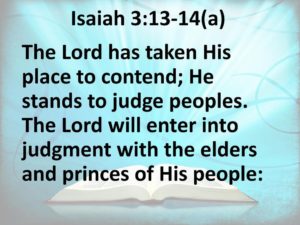 Israel was planted by the Lord as His choice vine in His own vineyard. However, it proves to be a false vine. It fails to bring forth fruit to the glory of God. It sabotages the beautiful intentions He had for the vineyard.
Israel was planted by the Lord as His choice vine in His own vineyard. However, it proves to be a false vine. It fails to bring forth fruit to the glory of God. It sabotages the beautiful intentions He had for the vineyard.
In contrast to Israel, ‘the false vine’, Jesus will announce that He is ‘the true vine (John 15:1).
John 15:1 1 “I am the true vine, and My Father is the vinedresser.
God’s vineyard was to be a picture of peace, harmony, love, and loveliness.
Now it is ruined by sin. Instead of focusing on the inward beauty of holiness, the women focused on outward beauty and disregarded their inward corruption (Isaiah 3:16-24). The men have relinquished their God-given responsibilities of leadership under the Word. Their acquiescence to worldliness will lead to their being overtaken by the enemy and killed by the sword (3:25).
In Chapter 4, Israel is desperate for deliverance (4:1), and rightfully so. The deliverance will come through the promised BRANCH (4:2). Chapter 4 is the briefest chapter in the Book, containing only 6 verses.
Judgment decimates a society. The wages of sin is death (Romans 6:23). Wartimes have reduced populations drastically, especially with so many men dying on the frontlines of battle. In verse one we read of a manpower shortage.
In verse 2, we read a phrase that will appear often as we read the prophets, “In that day”, referring to the Day of the Lord. This is the period when God comes in judgment and clears the way for His righteous rule upon the earth. The Hebrew day always begins at sundown. The darkness of judgment comes before the dawn of the righteous rule of God and the peaceable kingdom. The cross comes before Pentecost. The Passover Lamb must be slain before there is the pillar of cloud and fire of God’s tabernacling among men.
There are 18 Hebrew words that are translated by the one English word, ‘branch’. They all refer to the Lord Jesus. The word in verse 2 means ‘sprout’. Jesus is the One who springs forth to fulfill the promise of deliverance. He will bring cleansing, holiness, and fruitfulness to the surviving remnant. He will accomplish this by the Spirit of Judgement and Spirit of burning, purifying fire (4:4). He answers their prayer to ‘take away’ their ‘disgrace’ (4:1).
The result of this purification will be the restoration of God’s rule in the midst of His people (4:5-6). His presence is symbolized by the cloud and His protection is symbolized by the shelter.
Isaiah 4:5-6 5 then the LORD will create over the whole area of Mount Zion and over her assemblies a cloud by day, even smoke, and the brightness of a flaming fire by night; for over all the glory will be a canopy. 6 There will be a shelter to give shade from the heat by day, and refuge and protection from the storm and the rain.
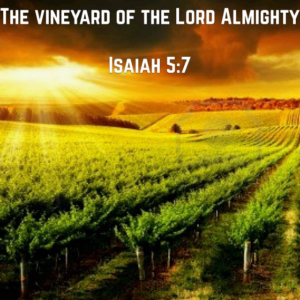 The prophecy (Chapter 2-5) culminates with this prophetic interpretation of Israel’s history, the parable of the Vineyard. Jesus will use this image in his parables also.
The prophecy (Chapter 2-5) culminates with this prophetic interpretation of Israel’s history, the parable of the Vineyard. Jesus will use this image in his parables also.
Israel is likened to a vineyard, planted by the Lord. It is separate from the world and protected by a fence. The border wall safeguards the fact that it belongs to the Lord and He will do all that He can to protect it. The gathered-out stones speak of their previous history in which the Lord brought them into the land to cleanse it of idolatries before taking full possession of it. The building of the tower speaks of the provision given to provide watchcare through godly oversight. The winepress speaks of the purpose of the vineyard to bring forth the wine, which is a symbol of that which brings glory to God and joyful satisfaction to humankind.
However, the vineyard proves to be a complete loss and it is the fault of the false vine. The Lord looked for the fruit of righteousness and justice but instead found oppression and violence, resulting in distress and bloodshed (5:7).
These sins are denounced in a series of 6 woes (curses). The first woe is against land speculators (5:9-10). They thought little of ousting the poor as they pursued their interests in real estate development. Their properties will go to ruin and their crops will fail.
The second woe will be against those addicted to pleasure (5:11-17). Those addicted to wine, drugs and their various addictions will foolishly see their lives ruined. Their irresponsibility will lead to impaired understanding (v.13) and early death (v.14). They will lose their good standing in their society, family, and workplace, and brought low (v.15). In allowing this judgment of abandoning them to their desires, God will show Himself to be righteous. Their fields will be left for others to feed upon.
The third woe is upon the defiant skeptics (5:18-19). They proudly rationalize their disobedience to God’s Word. Their disbelief is due to the fact that they have harnessed themselves to sin, preferring it to God, and drag it along like an ox drawing along a weighty cart.
The fourth woe is upon those who revise the moral code to fit their wickedness. The old immorality becomes the new morality.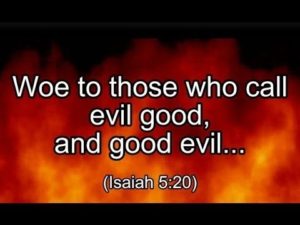
Isaiah 5:20 20 Woe to those who call evil good, and good evil; Who substitute darkness for light and light for darkness; Who substitute bitter for sweet and sweet for bitter!
The fifth woe is to the self-proclaimed ‘brights’, the self-righteous, intellectually prideful.
Isaiah 5:21 21 Woe to those who are wise in their own eyes and clever in their own sight!
The sixth and final woe is against moral cowardice. They cater to the crowds, accept bribes, deny justice to the innocent, and prefer self-rule to the rule of God.
Isaiah 5:24 24 Therefore, as a tongue of fire consumes stubble And dry grass collapses into the flame, So their root will become like rot and their blossom blow away as dust; For they have rejected the law of the LORD of hosts And despised the word of the Holy One of Israel.
The title “The Holy One of Israel” is used 23 times in Isaiah, more than in any other Book of the Bible. A read-through of the Book of Isaiah will give us all a greater appreciation for God’s holiness. May it inspire our worship. May we also appreciate the fact that, like Israel, our flesh is a false vine. It fails to bring forth fruit that glorifies God and profits nothing (John 15:4; 6:63). But Jesus is the true vine, and the fruit of His indwelling Spirit brings forth that which is pleasing both to God and others. Are we being fruitful as disciples of the Lord Jesus?
TODAY’S READING FROM THE NEW TESTAMENT – 2 CORINTHIANS 11:1-15
Paul’s intention is to present each believer and every church before God as fully mature and fully devoted. As those who have been betrothed to the Lord, we are to forsake all others and be fully consecrated to Him alone as our heavenly bridegroom.
He does not want to see the affections of the bride of Christ captured by any other suiter.
2 Corinthians 11:2 2 For I am jealous for you with a godly jealousy; for I betrothed you to one husband, so that to Christ I might present you as a pure virgin.
Paul addresses the false teachers, the popular ‘super-apostles’, who were deceiving the church with a message that removed them from faith in the perfections of Christ and His finished work of redemption.
Paul said that they preached another Jesus, a false gospel, and they offered a different spirit. Their teaching undermined the authority of God’s Word.
The church a Corinth had come under the influence of itinerant speakers who charged fees for their insights and instruction on gaining greater intimacy with God and having a more satisfactory life. These false teachers dismissed Paul and his teaching. They said that the reason he did not ask for money was that he had nothing to say that was worth hearing.
Paul explains that the reason he did not charge money or beg for their financial support was because he did not want to be a burden to them. In fact, other churches were supporting him so he could minister in Corinth freely. He defends his record of financial integrity, although he makes an apology for having to do so. He makes his boast in order to cut the ground out from underneath those who were attacking him with false charges (2 Corinthians 11:7-15).
We are to be aware that Satan continues to undermine the authority of God’s Word with subtle distortions, deceptions, and outright contradictions. He masquerades himself, falsely appearing to be on the outside (light) what he is not on the inside. For He is the prince of darkness.
There is no other righteousness than that which comes to us via the cross of Christ. Beware of the darkness of false gospels.
TODAY’S READING FROM THE BOOK OF PSALMS – PSALM 53:1-6
You will already be familiar with this Psalm because it is a repetition of what we read in Book 1 of Psalms, in Psalm 14.
If you compare the two you will notice slight variations of this song. This may be because of a special need for its application. These verses also appear in Paul’s letter to the Romans, when he is proving from Scripture man’s total depravity.
“There is no one who does good. No not even one” (Psalm 51:3, 14:3; Romans 3:10)
Jesus said, “There is none good, but One, that is, God” (Matthew 19:17; Mark 10:18).
Psalm 53 adds this variation to Psalm 14. Whereas Psalm 14:5 simply says, “They are in great terror for God is with the generation of the righteous”, Psalm 53:5 says, “There they are, in great terror, where there is no terror” (ESV). This reminds us that when we begin with ‘the fear of the Lord’ there will be no reason to fear, even when the threat of fear is thrown upon us. Why? Because God is with us.
TODAY’S READING FROM THE BOOK OF PROVERBS – PROVERBS 22:28-29
Proverbs 22:28-29 28 Do not move the ancient boundary Which your fathers have set. 29 Do you see a man skilled in his work? He will stand before kings; He will not stand before obscure men.
We should respect that there are reasons for the ancient boundaries and not quickly remove them. God gives us talents, but we must develop them in order to achieve skill. This effort will distinguish us from those who fail to do so.
PRAY FOR THE NATIONS –
Myanmar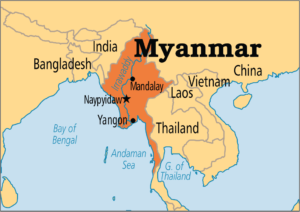
Union of Myanmar
Asia
Geography
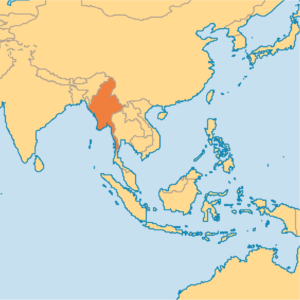 Area: 676,577 sq. km
Area: 676,577 sq. km
Basin and delta of the Irrawaddy River ringed by a horseshoe of high mountains that isolates the country from India, China and Thailand.
Population: 50,495,672 Annual Growth: 0.87%
Capital: Naypyidaw
Urbanites: 33.9%
HDI Rank: 138 of 182 (UN Human Development Reports 2009)
Peoples
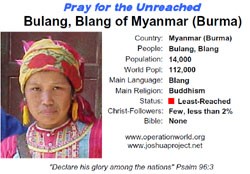 Peoples: 142 (36% unreached) All peoples
Peoples: 142 (36% unreached) All peoples
Unreached Peoples Prayer Card
Official language: Burmese Languages: 116 All languages
Religion
Largest Religion: Buddhist
|
Religion |
|
Pop % |
Ann Gr |
|
4,534,511 |
8.98 |
2.7 |
|
|
2,517,184 |
5.0 |
2.5 |
|
|
Buddhist |
40,416,736 |
80.04 |
Answer to Prayer
Praise God for the refining of the Church, made possible by the desperation of persecution, poverty and isolation. Liberal groups have drawn closer to biblical truth, and lax believers are driven toward a more dynamic life of faith. Myanmar is a classic example of how suffering, while lamentable, serves to accomplish God’s purposes for His people.
Challenge for Prayer
The military regime seeks to destroy Christianity (which it calls “the C-virus”), yet faith keeps spreading. Christians are generally kept out of positions of power and influence. Military campaigns against Christian minorities are well publicized, and over 3,000 Christian villages have been burned out in the last 10 years. Churches are not given permission to register and are thereby considered illegal and subject to harassment. The expulsion of foreign Christian workers in 1966 left a young church to cope on its own with little mature leadership or infrastructure. Adversity, persecution and isolation have helped shape a resilient, enduring faith.
PRAYER: Gracious God and Father, we marvel at Your mercy. What more could you have done than what You have done for Your vineyard? You have given us Your Son, the True Vine. In Him we have the assurance of a life that will bear fruit if we remain in Him. Thank You for calling us to Yourself, fencing us in to Your care, filling us with Your presence and covering us with the canopy of Your protection. We rejoice with gladness that You have restored that which was lost through the disobedience of Adam. Empower us with the obedience of a faith that works by love through Your indwelling Holy Spirit. In Jesus’ Name. Amen.
